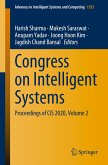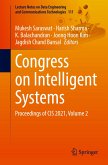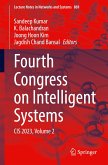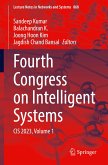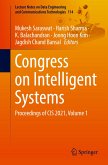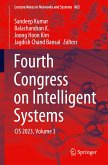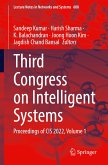Congress on Intelligent Systems
Proceedings of CIS 2020, Volume 1
Herausgegeben:Sharma, Harish; Saraswat, Mukesh; Yadav, Anupam; Kim, Joong Hoon; Bansal, Jagdish Chand
Congress on Intelligent Systems
Proceedings of CIS 2020, Volume 1
Herausgegeben:Sharma, Harish; Saraswat, Mukesh; Yadav, Anupam; Kim, Joong Hoon; Bansal, Jagdish Chand
- Broschiertes Buch
- Merkliste
- Auf die Merkliste
- Bewerten Bewerten
- Teilen
- Produkt teilen
- Produkterinnerung
- Produkterinnerung
This book is a collection of selected papers presented at the First Congress on Intelligent Systems (CIS 2020), held in New Delhi, India during September 5 - 6, 2020. It includes novel and innovative work from experts, practitioners, scientists and decision-makers from academia and industry. It covers topics such as Internet of Things, information security, embedded systems, real-time systems, cloud computing, big data analysis, quantum computing, automation systems, bio-inspired intelligence, cognitive systems, cyber physical systems, data analytics, data/web mining, data science,…mehr
Andere Kunden interessierten sich auch für
![Congress on Intelligent Systems Congress on Intelligent Systems]() Congress on Intelligent Systems112,99 €
Congress on Intelligent Systems112,99 €![Congress on Intelligent Systems Congress on Intelligent Systems]() Congress on Intelligent Systems171,99 €
Congress on Intelligent Systems171,99 €![Fourth Congress on Intelligent Systems Fourth Congress on Intelligent Systems]() Fourth Congress on Intelligent Systems134,99 €
Fourth Congress on Intelligent Systems134,99 €![Fourth Congress on Intelligent Systems Fourth Congress on Intelligent Systems]() Fourth Congress on Intelligent Systems149,99 €
Fourth Congress on Intelligent Systems149,99 €![Congress on Intelligent Systems Congress on Intelligent Systems]() Congress on Intelligent Systems164,99 €
Congress on Intelligent Systems164,99 €![Fourth Congress on Intelligent Systems Fourth Congress on Intelligent Systems]() Fourth Congress on Intelligent Systems134,99 €
Fourth Congress on Intelligent Systems134,99 €![Third Congress on Intelligent Systems Third Congress on Intelligent Systems]() Third Congress on Intelligent Systems186,99 €
Third Congress on Intelligent Systems186,99 €-
-
-
This book is a collection of selected papers presented at the First Congress on Intelligent Systems (CIS 2020), held in New Delhi, India during September 5 - 6, 2020. It includes novel and innovative work from experts, practitioners, scientists and decision-makers from academia and industry. It covers topics such as Internet of Things, information security, embedded systems, real-time systems, cloud computing, big data analysis, quantum computing, automation systems, bio-inspired intelligence, cognitive systems, cyber physical systems, data analytics, data/web mining, data science, intelligence for security, intelligent decision making systems, intelligent information processing, intelligent transportation, artificial intelligence for machine vision, imaging sensors technology, image segmentation, convolutional neural network, image/video classification, soft computing for machine vision, pattern recognition, human computer interaction, robotic devices and systems, autonomous vehicles,intelligent control systems, human motor control, game playing, evolutionary algorithms, swarm optimization, neural network, deep learning, supervised learning, unsupervised learning, fuzzy logic, rough sets, computational optimization, and neuro fuzzy systems.
Produktdetails
- Produktdetails
- Advances in Intelligent Systems and Computing 1334
- Verlag: Springer / Springer Nature Singapore / Springer, Berlin
- Artikelnr. des Verlages: 978-981-33-6980-1
- 1st ed. 2021
- Seitenzahl: 832
- Erscheinungstermin: 28. Mai 2021
- Englisch
- Abmessung: 235mm x 155mm x 45mm
- Gewicht: 1235g
- ISBN-13: 9789813369801
- ISBN-10: 9813369809
- Artikelnr.: 60810537
- Herstellerkennzeichnung
- Springer-Verlag GmbH
- Tiergartenstr. 17
- 69121 Heidelberg
- ProductSafety@springernature.com
- Advances in Intelligent Systems and Computing 1334
- Verlag: Springer / Springer Nature Singapore / Springer, Berlin
- Artikelnr. des Verlages: 978-981-33-6980-1
- 1st ed. 2021
- Seitenzahl: 832
- Erscheinungstermin: 28. Mai 2021
- Englisch
- Abmessung: 235mm x 155mm x 45mm
- Gewicht: 1235g
- ISBN-13: 9789813369801
- ISBN-10: 9813369809
- Artikelnr.: 60810537
- Herstellerkennzeichnung
- Springer-Verlag GmbH
- Tiergartenstr. 17
- 69121 Heidelberg
- ProductSafety@springernature.com
Harish Sharma is Associate Professor at Rajasthan Technical University, Kota, in the Department of Computer Science & Engineering. He has worked at Vardhaman Mahaveer Open University Kota, and Government Engineering College Jhalawar. He received his B.Tech. and M.Tech. degree in Computer Engineering from Government Engineering College, Kota, and Rajasthan Technical University, Kota, in 2003 and 2009, respectively. He obtained his Ph.D. from ABV-Indian Institute of Information Technology and Management, Gwalior, India. He is the secretary and one of the founder members of Soft Computing Research Society of India. He is a lifetime member of Cryptology Research Society of India, ISI, Kolkata. He is Associate Editor of "International Journal of Swarm Intelligence (IJSI)" published by Inderscience. He has also edited special issues of the many reputed journals like "Memetic Computing", "Journal of Experimental and Theoretical Artificial Intelligence", and "Evolutionary Intelligence". His primary area of interest is nature-inspired optimization techniques. He has contributed to more than 65 papers published in various international journals and conferences. Dr. Mukesh Saraswat is Associate Professor at Jaypee Institute of Information Technology, Noida, India. Dr. Saraswat has obtained his Ph.D. in Computer Science & Engineering from ABV-IIITM Gwalior, India. He has more than 18 years of teaching and research experience. He has guided 02 Ph.D. students, more than 50 M.Tech. and B.Tech. dissertations, and presently guiding 05 Ph.D. students. He has published more than 40 journal and conference papers in the area of image processing, pattern recognition, data mining, and soft computing. He was the part of successfully completed DRDE funded project on image analysis and currently running two projects funded by SERB-DST (New Delhi) on Histopathological Image Analysis and Collaborative Research Scheme (CRS), Under TEQIP III (RTU-ATU) on Smile. He has been an active member of many organizing committees of various conferences and workshops. He was also Guest Editor of the Journal of Swarm Intelligence. He is an active member of IEEE, ACM, and CSI Professional Bodies. His research areas include image processing, pattern recognition, mining, and soft computing. Dr. Anupam Yadav is Assistant Professor, Department of Mathematics, Dr. BR Ambedkar National Institute of Technology Jalandhar, India. His research area includes numerical optimization, soft computing, and artificial intelligence; he has more than ten years of research experience in the areas of soft computing and optimization. Dr. Yadav has done Ph.D. in soft computing from Indian Institute of Technology Roorkee, and he worked as Research Professor at Korea University. He has published more than twenty-five research articles in journals of international repute and has published more than fifteen research articles in conferenceproceedings. Dr. Yadav has authored a textbook entitled "An introduction to neural network methods for differential equations". He has edited three books which are published by AISC, Springer Series. Dr. Yadav was General Chair, Convener, and a member of steering committee of several international conferences. He is Associate Editor in the journal of the experimental and theoretical artificial intelligence. Dr. Yadav is a member of various research societies. Professor Kim, Dean of Engineering College of Korea University, obtained his Ph.D. degree from the University of Texas at Austin in 1992 with the thesis title "Optimal replacement/rehabilitation model for water distribution systems". Prof. Kim's major areas of interest include optimal design and management of water distribution systems, application of optimization techniques to various engineering problems, and development and application of evolutionary algorithms. His paper which introduced the Harmony Search algorithm has been cited for more than 5,000 times according to Google Scholar. He has been the faculty of School of Civil, Environmental and Architectural Engineering at Korea University since 1993. He has hosted international conferences including APHW 2013, ICHSA 2014 & 2015, and HIC 2016 and has given keynote speeches at many international conferences including 2013, GCIS 2013, SocPros 2014 & 2015, SWGIC 2017, and RTORS 2017. He is a member of National Academy of Engineering of Korea since 2017. Dr. Jagdish Chand Bansal is Associate Professor at South Asian University New Delhi and Visiting Faculty at Maths and Computer Science, Liverpool Hope University UK. Dr. Bansal has obtained his Ph.D. in Mathematics from IIT Roorkee. Before joining SAU New Delhi, he has worked as Assistant Professor at ABV-Indian Institute of Information Technology and Management Gwalior and BITS Pilani. He is Series Editor of the book series Algorithms for Intelligent Systems (AIS) published by Springer. He is Editor-in-Chief of International Journal of Swarm Intelligence (IJSI) published by Inderscience. He is also Associate Editor of IEEE ACCESSS published by IEEE. He is the steering committee member and General Chair of the annual conference series SocProS. He is the general secretary of Soft Computing Research Society (SCRS). His primary area of interest is swarm intelligence and nature-inspired optimization techniques. Recently, he proposed a fission-fusion social structure-based optimization algorithm, Spider Monkey Optimization (SMO), which is being applied to various problems from engineering domain. He has published more than 70 research papers in various international journals/conferences. He has supervised Ph.D. theses from ABV-IIITM Gwalior and SAU New Delhi. He has also received Gold Medal at UG and PG levels.
Modelling Subjective Happiness with a Survey Poisson Model and XGBoost using an Economic Security Approach.- Monitoring web-based evaluation of online reputation in Barcelona.- Information Technology for the Synthesis of Optimal Spatial Configurations with Visualization of the Decision-Making Process.- Hybrid Approach to Combinatorial and Logic Graph Problems.- Energy Efficient Algorithms Used In Datacenters : A Survey.- Software Log Anomaly Detection Method using HTM Algorithm.- Logical Inference in Predicate Calculus with the Definition of Previous Statements.- Congestion Management Considering Demand Response Programs using Multi-objective Grasshopper Optimization Algorithm.- A Hardware accelerator implementation of Multilayer Perceptron.- Building a classifier of behavior patterns for semantic search based on cuckoo search meta-heuristics.- TETRA Enhancement Based on Adaptive Modulation.- Dynamic stability enhancement of grid connected wind system using grey wolf optimization technique.- A Comparative Analysis on wide area power system control with Mitigation the effects of imperfect medium.- Adware Attack Detection on IoT Devices using Deep Logistic Regression SVM (DL-SVM-IOT).- Intrusion Detection System for Securing Computer Networks Using Machine Learning: A Literature Review.- An Exploration of Entropy techniques for Envisioning Announcement Period of Open Source Software.- Occurrence prediction of pests and diseases in rice of weather factors using Machine Learning.- A Literature Review on Generative Adversarial Networks with its Applications in Healthcare.- A Federated Search System for Online Property Listings Based on SIFT Algorithm.- Digital Brain Building a Key to Improve Cognitive Functions by an EEG-Controlled Videogames as Interactive Learning Platform.- Intelligent car cabin safety system through IoT application.- Utilization of Delmia Software for Saving Cycle Time in Robotics Spot Welding.- Data protection techniques over multi-cloudenvironment- a review.- Review Paper: Error Detection and Correction onboard Nanosatellites.- Kerala Floods : Twitter Analysis using Deep Learning Techniques.- An Improved DVFS Circuit & Error Correction Technique.- Effective Predictive Maintenance to overcome System Failures - A Machine Learning Approach.- IN-LDA: An Extended Topic Model for Efficient Aspect Mining.- Imbalance Rectification using Venn Diagram based Ensemble of Undersampling Methods for Disease Datasets.
Modelling Subjective Happiness with a Survey Poisson Model and XGBoost using an Economic Security Approach.- Monitoring web-based evaluation of online reputation in Barcelona.- Information Technology for the Synthesis of Optimal Spatial Configurations with Visualization of the Decision-Making Process.- Hybrid Approach to Combinatorial and Logic Graph Problems.- Energy Efficient Algorithms Used In Datacenters : A Survey.- Software Log Anomaly Detection Method using HTM Algorithm.- Logical Inference in Predicate Calculus with the Definition of Previous Statements.- Congestion Management Considering Demand Response Programs using Multi-objective Grasshopper Optimization Algorithm.- A Hardware accelerator implementation of Multilayer Perceptron.- Building a classifier of behavior patterns for semantic search based on cuckoo search meta-heuristics.- TETRA Enhancement Based on Adaptive Modulation.- Dynamic stability enhancement of grid connected wind system using grey wolf optimization technique.- A Comparative Analysis on wide area power system control with Mitigation the effects of imperfect medium.- Adware Attack Detection on IoT Devices using Deep Logistic Regression SVM (DL-SVM-IOT).- Intrusion Detection System for Securing Computer Networks Using Machine Learning: A Literature Review.- An Exploration of Entropy techniques for Envisioning Announcement Period of Open Source Software.- Occurrence prediction of pests and diseases in rice of weather factors using Machine Learning.- A Literature Review on Generative Adversarial Networks with its Applications in Healthcare.- A Federated Search System for Online Property Listings Based on SIFT Algorithm.- Digital Brain Building a Key to Improve Cognitive Functions by an EEG-Controlled Videogames as Interactive Learning Platform.- Intelligent car cabin safety system through IoT application.- Utilization of Delmia Software for Saving Cycle Time in Robotics Spot Welding.- Data protection techniques over multi-cloudenvironment- a review.- Review Paper: Error Detection and Correction onboard Nanosatellites.- Kerala Floods : Twitter Analysis using Deep Learning Techniques.- An Improved DVFS Circuit & Error Correction Technique.- Effective Predictive Maintenance to overcome System Failures - A Machine Learning Approach.- IN-LDA: An Extended Topic Model for Efficient Aspect Mining.- Imbalance Rectification using Venn Diagram based Ensemble of Undersampling Methods for Disease Datasets.


